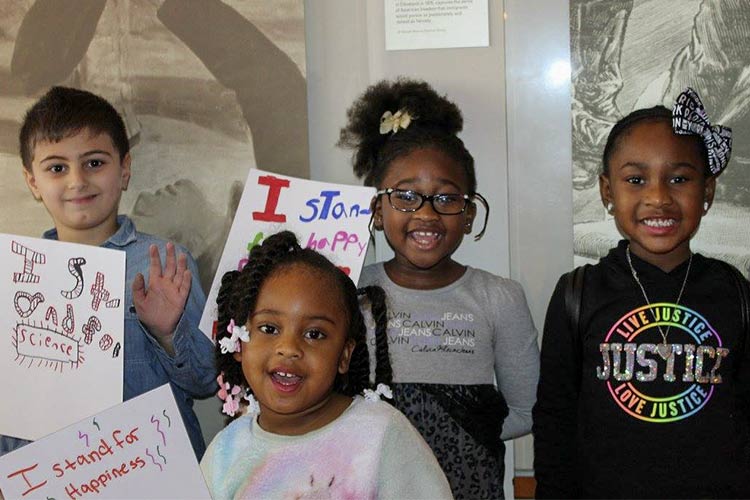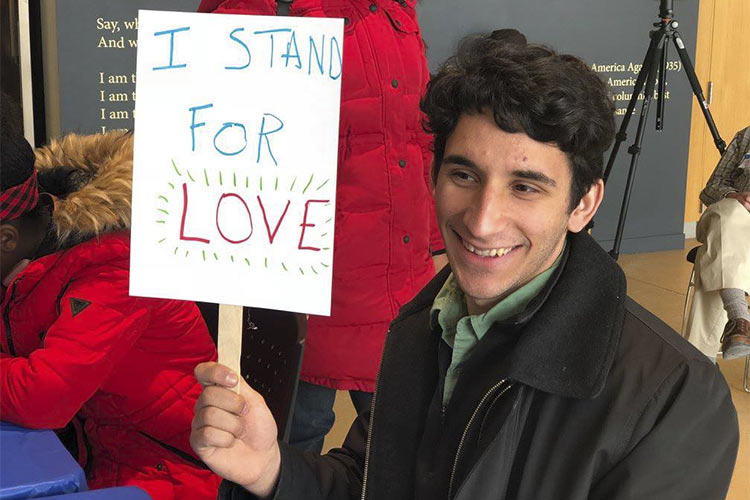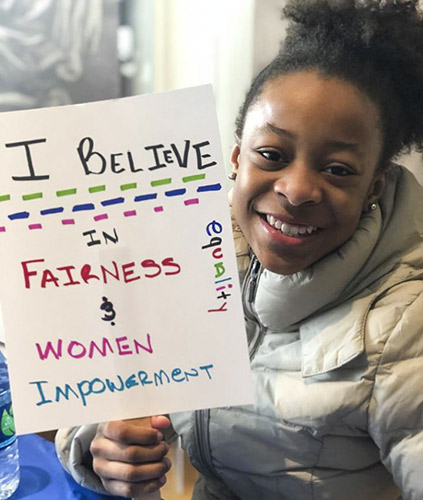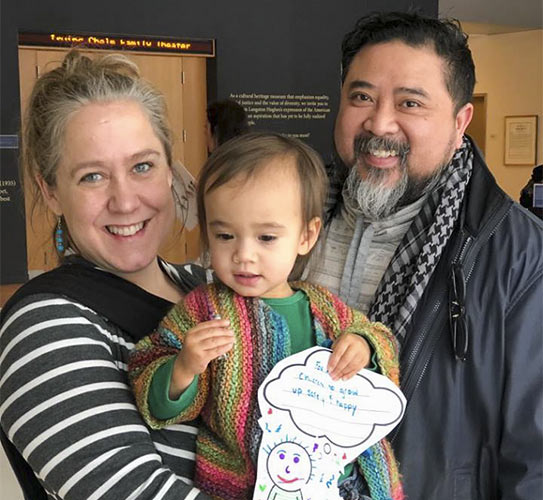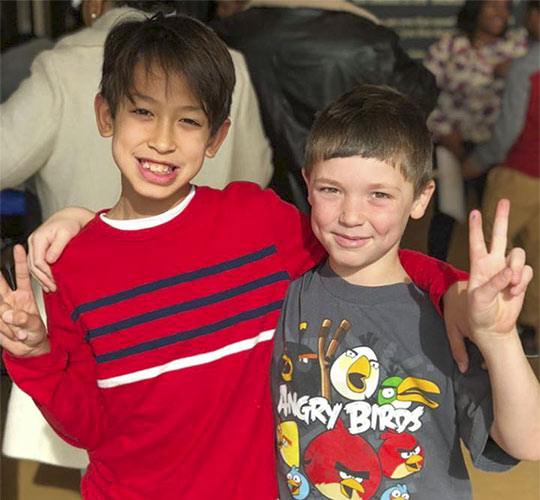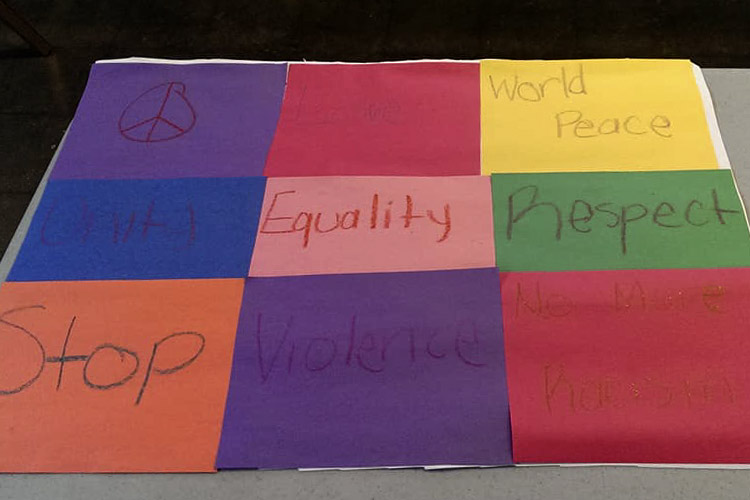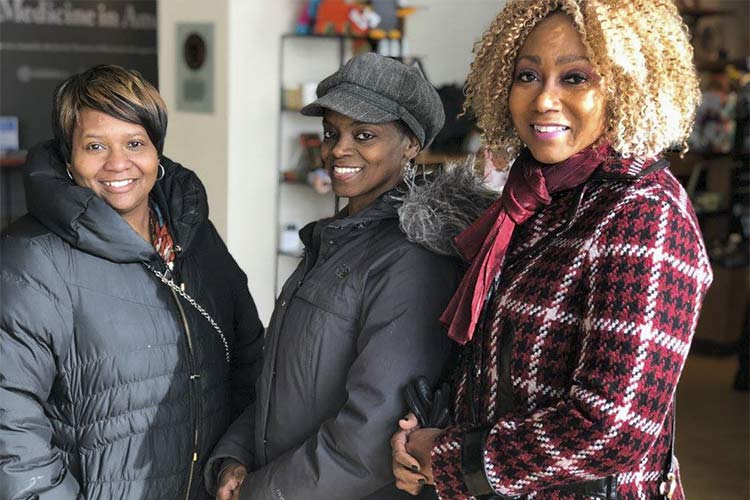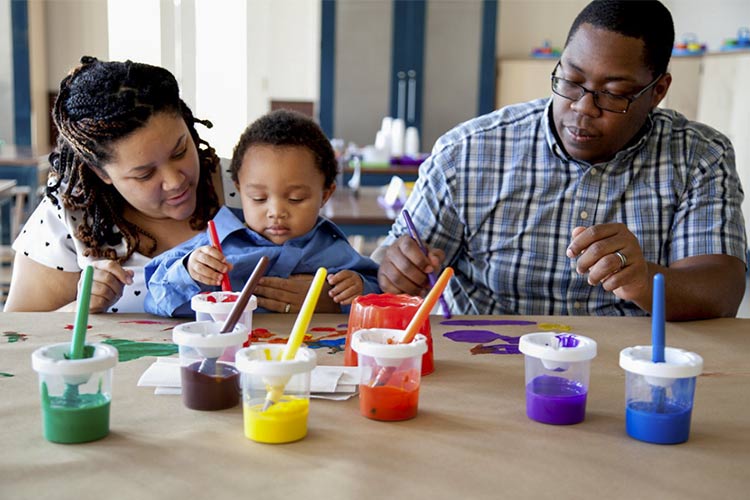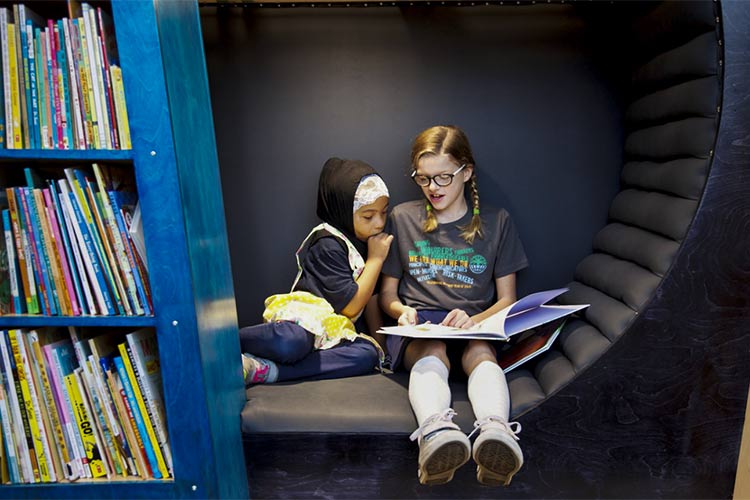Cuyahoga Arts & Culture grantees to honor Martin Luther King Jr.'s impact in CLE and beyond
The Rev. Dr. Martin Luther King, Jr. is known by all for his work in the Civil Rights movement in the 1950s and 1960s through nonviolence and civil disobedience. Many people in Cleveland, however, may not be aware of how often King came through Cleveland in the 1960s—and the lasting influence he had on the city. From civil rights and Christianity to politics and school sit-ins, King was a well-known presence in Cleveland.
This Monday, January 21, is Martin Luther King, Jr. Day. While the nation celebrates Dr. King and his work in the Civil Rights movement and the advancement of all people, Cleveland, too, will celebrate and recognize Dr. King's contributions to Cleveland’s history and civil rights milestones.
Many Cuyahoga Arts & Culture partner organizations will celebrate as well, with many offering free admission, events, and performances honoring King’s legacy. Here’s a look at King’s local influence in the 1960s and some of the events planned for Monday.
A frequent visitor
Dr. King came to Cleveland more than a dozen times in the 1960s, often to visit with religious leaders or support politicians and local civil rights initiatives such as the United Freedom Movement.
“One of the reasons he came to Cleveland so many times is that the Civil Rights movement had really moved north,” explains John Grabowski, a Krieger Mueller associate professor of applied history at CWRU, historian, and senior vice president for research and publications at the Western Reserve Historical Society (WRHS). “In the mid-1960s, he was [here] to advocate for voter registration and to promote Carl Stokes."
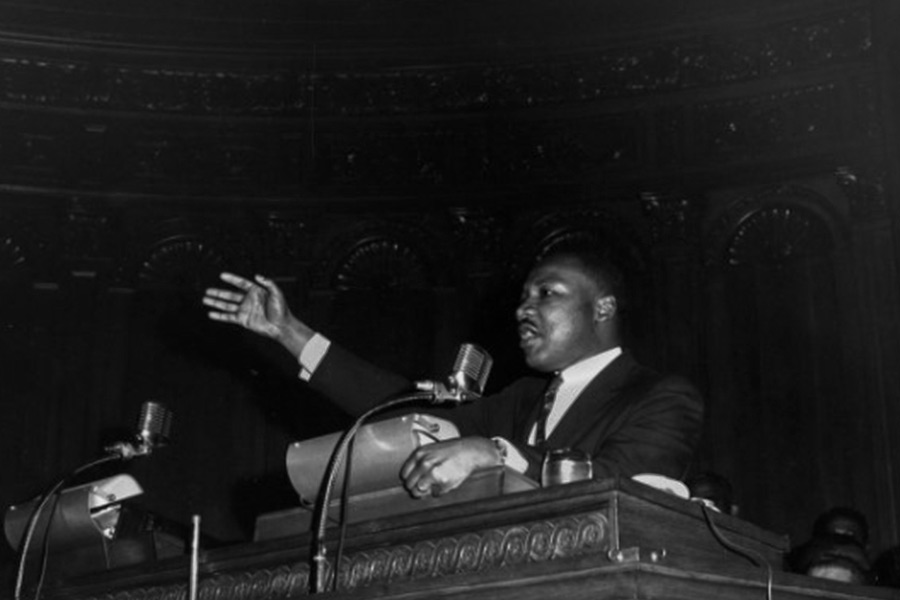 Dr. Martin Luther King, Jr. speaking at Cory United Methodist Church in Cleveland May 14th, 1963King spoke many times at Antioch Baptist Church and Cory Methodist Church (Cleveland’s largest black church in the 1960s), but also made appearances at predominantly white churches like St. Paul Episcopal Church—speaking to the Episcopal Society for Christian & Racial Unity—and Fairmount Presbyterian Church, both in Cleveland Heights.
Dr. Martin Luther King, Jr. speaking at Cory United Methodist Church in Cleveland May 14th, 1963King spoke many times at Antioch Baptist Church and Cory Methodist Church (Cleveland’s largest black church in the 1960s), but also made appearances at predominantly white churches like St. Paul Episcopal Church—speaking to the Episcopal Society for Christian & Racial Unity—and Fairmount Presbyterian Church, both in Cleveland Heights.
In 1961, King spoke to 3,900 people in two services at Antioch Church. When he returned in 1963 after the Birmingham, AL protests, chances to hear Dr. King speak were more in-demand. He was met by 10,000 to 14,000 people at Cory Church—even though the church could only accommodate 5,000.
In October 1964, just a week after winning the Nobel Peace Prize, King appeared at five street corner rallies during the “March to the Ballot Box.” On the same trip, he also visited two schools, as well as Olivet Institutional Church.
In 1967, King was in Cleveland often, urging people to register to vote and campaigning for Carl Stokes. “One of the things that stands out to people who grew up here is Carl Stokes’ election,” says Grabowski of King’s friendship with Stokes. “As the first African-American mayor of a major American city, that said that Cleveland could do the right thing when they needed to.”
King spoke to a small east side group in early 1968 and was scheduled to return to Cleveland on April 10—but was assassinated six days earlier on April 4, 1968.
In honor of Martin Luther King, Jr. Day, the WRHS will offer free admission. Additionally, the exhibit “Rev. E. Theophilus Caviness: Church, Community, Cleveland” will open Saturday, January 19. Caviness was not only friends with King, but was also at the forefront of Cleveland’s civil rights movement in the 1960s and continues to be a community leader. The exhibit focuses on Caviness’ involvement in the Civil Rights movement, his preaching, and music, as well as commitment to family and community. The opening ceremony will be from 2 to 4 p.m. at the Cleveland History Center.
Cleveland History Center, 10825 East Blvd., Cleveland; https://www.wrhs.org/plan-your-visit/history-center/
Signs of influence at Karamu
Founded in 1915, Karamu House is dedicated to the inclusivity of different racial, religious, and socio-economic backgrounds. It is also the oldest African-American theater in the United States.
“Karamu House, while being a place for all people, celebrates the African-American experience, and we recognize that the African-American experience is a shared experience in this country,” says Aseelah Shareef, director of operations and community engagement.
In fact, Karamu took the largest contingent in Ohio to the March of Washington in 1963. The buses convened and departed from Karamu House.
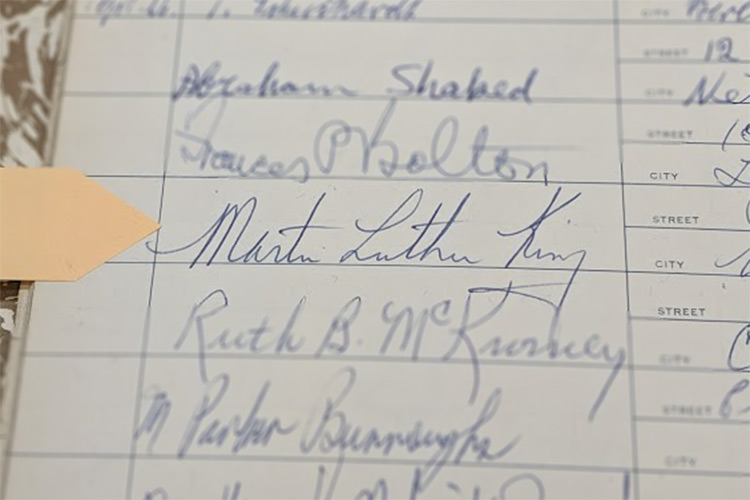 Dr. Martin Luther King, Jr. visited Karamu House and signed the guestbook in 1963 while in town to deliver a speech at Olivet Institutional Baptist ChurchAdditionally, in 2015, Karamu CEO Tony F. Sias discovered Dr. King’s signature in their guest book while going through the archives.
Dr. Martin Luther King, Jr. visited Karamu House and signed the guestbook in 1963 while in town to deliver a speech at Olivet Institutional Baptist ChurchAdditionally, in 2015, Karamu CEO Tony F. Sias discovered Dr. King’s signature in their guest book while going through the archives.
“He was flipping through the book out of curiosity, and sure enough, there was the signature of Dr. Martin Luther King, Jr.,” says Shareef. “The signature is dated September 1963. Dr. King was in town to speak at the installation of his friend, Rev. Kelly Miller Smith, as pastor of Antioch Baptist Church.”
Though Shareef acknowledges the importance of the holiday in imparting King's "lessons of humanity, equality, and justice," she believes that truly honoring King's memory is about "so much more than the holiday. I’d like Clevelanders to remember the great legacy of this great man, then go a step further [to] identify principles from his life that resonate with your own and make sure you are living those ideals, putting them into practice daily.”
Karamu—which received $83,447 in general operating support from Cuyahoga Arts & Culture for 2019—will host a free screening of I Am MLK Jr. at 1 p.m. on Monday, January 21. While tickets are free, advance registration is required.
Karamu House, 2355 E. 89th St., Cleveland; karamuhouse.org
Dr. King in the sporting world
The Baseball Heritage Museum will be open on MLK Day to highlight inspiration that King received from baseball pioneers like Jackie Robinson.
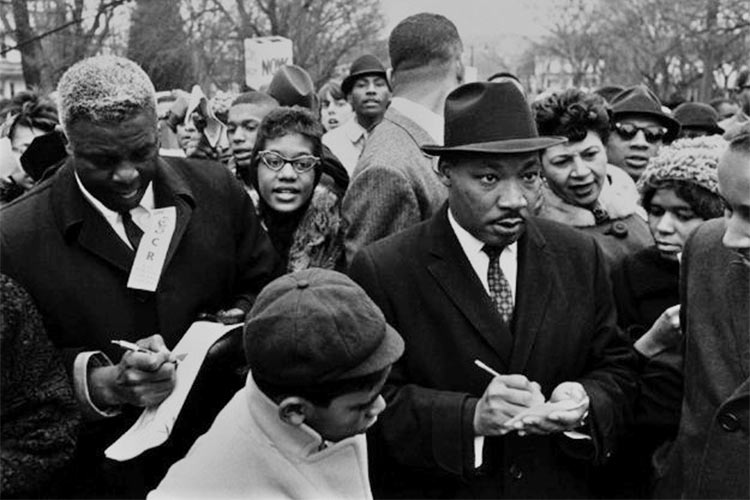 Dr. Martin Luther King, Jr. with Jackie Robinson (left)Robinson was chosen by Branch Rickey to integrate baseball, in part because of his demeanor. Robinson was moved by the social movements of the nation, and when retired in the 1960s, he became a broadcaster and a close friend of Dr. King.
Dr. Martin Luther King, Jr. with Jackie Robinson (left)Robinson was chosen by Branch Rickey to integrate baseball, in part because of his demeanor. Robinson was moved by the social movements of the nation, and when retired in the 1960s, he became a broadcaster and a close friend of Dr. King.
And just a month before his death, King reportedly told pitcher Don Newcombe how impactful he and other African-American baseball figures were on his life.
“It was 28 days before Dr. King's assassination in 1968, and he was in the midst of peaceful protest speeches, marches, and demonstrations,” says Margaret Reardon, museum administrator. “On his way home to Atlanta, with an evening to relax, Dr. King visited Newcombe and let him know what he, Jackie Robinson, Larry Doby and Roy Campanella had meant to the civil rights struggle.”

Reardon says Newcombe still talks about King’s words to him today.
A 2019 recipient of $4,000 in Project Support II from Cuyahoga Arts & Culture, the Baseball Heritage Museum will celebrate Dr. King’s connections to baseball in a one-day event from 10 a.m. to 2 p.m.
Kids can participate in an “I Have a Dream” craft project, writing down words that reflect what their dreams are for today, for life, and for the world. The art will then be displayed in the museum.
Walk-in guests are welcome, but registration is encouraged.
Baseball Heritage Museum, 6601 Lexington Ave., Cleveland; baseballheritagemuseum.org
A multi-media celebration at Maltz Museum
The Maltz Museum of Jewish Heritage will host a free Hear Our Voices MLK Day Celebration to honor Dr. King and everyday people who fought against discrimination. Dahlia Fisher, Maltz’s director of external relations, says the annual event is one of the museum’s most popular days.
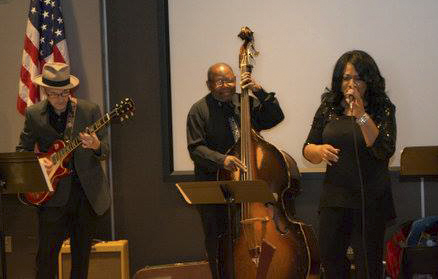 MLK event at the Maltz Museum of Jewish HeritageThe free event runs from 11 a.m. to 5 p.m., including an 11 a.m. performance by the On the One Band, a group of students and teachers who use music to overcome hardships, and a 1 p.m. performance by vocalist Evelyn Wright with the Roots of American Music Quartet.
MLK event at the Maltz Museum of Jewish HeritageThe free event runs from 11 a.m. to 5 p.m., including an 11 a.m. performance by the On the One Band, a group of students and teachers who use music to overcome hardships, and a 1 p.m. performance by vocalist Evelyn Wright with the Roots of American Music Quartet.
At 3 p.m. a group of panelists will reflect on the legacy of Dr. King’s work on voting as a civil right and discuss contemporary issues around access to the ballot and voting rights in our society today.
“These are all groups and people working toward a better world,” says Fisher. “It’s all about what we can do as a group to continue [King's] legacy.”
Panelists include Crystal Bryant (director of Cuyahoga County Health and Human Services Office of Reentry and co-founder of Cleveland VOTES); Kim Amponsah (Cleveland Municipal Court magistrate and member of the National Council of Negro Women); Phyllis Harris (executive director of the LGBT Community Center of Greater Cleveland); and Danielle Sydnor, (executive director of the Northern Ohio ECDI and president-elect of the Cleveland Branch NAACP).
A craft project will invite kids and adults alike to create their own I Have a Dream banners, which will then be displayed for entire week. Guests are also invited to tour core and current exhibits at the museum, which received a general operating support grant of $126,368 from CAC for 2019.
Maltz Museum of Jewish Heritage, 2929 Richmond Road, Beachwood; maltzmuseum.org
 MLK event at the Baseball Heritage MuseumStories and crafts at the Children’s Museum
MLK event at the Baseball Heritage MuseumStories and crafts at the Children’s Museum
Martin Luther King, Jr. Day is all about dreams at the Children’s Museum of Cleveland. On Monday, the museum’s regular story time will focus on Dr. King. “We will be reading a kid’s version of the ‘I have a Dream’ speech in storybook form, and other books about everyone getting along with each other and working together,” says Kelsey Tarase, director of education.
Elsewhere in the museum, kids can create a peace dove. Using a dove stencil and an ink pad, participants can fill in the dove with their fingerprints.
Another project will revolve around the King quote: “If you can't fly, then run. If you can't run, then walk. If you can't walk, then crawl. But whatever you do, you have to keep moving forward.” The quote will be displayed on a blank art wall. Participants will then have Post-It notes, with which they can write down what dreams they want to pursue as they move forward. “We want to tie in to the quote and keep them thinking about their dreams,” says Tarase.
A recipient of $57,742 in general operating support from CAC for 2019, the museum is open from 9 a.m. to 4 p.m., with story time at 11 a.m. Admission is $12, but on Monday, one dollar of each admission will be donated to the United Black Fund of Greater Cleveland. Children under 11 months are free.
The Children's Museum of Cleveland, 3813 Euclid Ave, Cleveland; cmcleveland.org


